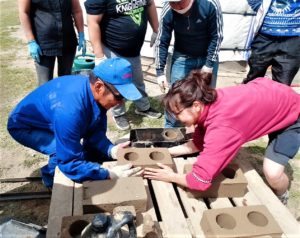Improve the resilience of rural Mongolian communities in the face of climate change through the development of insulation and local sustainable construction
State : In progress | Number of beneficiaries : 14 850 people
Project duration : 5 years
Location : Khishig-Undur village and other villages in Bulgan province, Mongolia
Local partner
The Ecosoum association was created in 2018 and immediately embarked on its first project, dedicated to improving the management of household waste.
Since then, Ecosoum has also been developing:
- an agricultural project aimed at supporting and developing local organic farming,
- another project aimed at strengthening artisanal production capacities of local goods and services useful to the people of the soum.
These projects are all carried out with a view to increasing local resilience, particularly in the face of climate change.
The Ecosoum association is particularly legitimate in the implementation of its projects because it is made up exclusively of inhabitants of the villages where the projects take place and it benefits from the formal recognition of local authorities in the implementation of such projects. Ecosoum also counts among its associative members based in Ulan Bator many volunteers with expertise in fields related to climate change issues (architect specializing in energy efficiency, water and environment engineers, etc.).
In addition, this is a project that is perfectly consistent with the mandate and the other projects of the association (waste management, sustainable agriculture and breeding, etc.), all of which aim to fight for the protection of environment and against climate change.

Context
The average population density in Mongolia is the lowest in the world with just over 2 inhabitants. / km². In addition, more than 50% of the population living in cities (mainly in the capital Ulaanbaatar) infers that the average density in rural areas is actually only around 1 inhabitant. / km². The serious difficulties linked to climate change that the countryside has known in recent years, known as “dzuds” (extreme droughts and cold weather) have pushed a large number of herders to the cities. Since the 2000s, at least 15% of the Mongolian population has migrated to the capital and its surroundings, where living conditions generate economic and social problems (problem of decent housing, precarious economic situation, recurring family problems, etc.). Today, only a third of Mongolians still live on nomadic pastoralism, up from 80% in 1980. The resilience of local communities to climate change therefore seems to be the main issue for the development of this country.
The mission
General objective: Improve the resilience of Mongolian rural communities by reducing the consumption of local resources and promoting waste recovery.
Specific objective: Improve the resilience of Mongolian rural communities through the development of insulation and local sustainable construction.
Activities
- Development and construction of a production unit for compressed earth bricks (CEB) pilot in Khishig-Undur, training of teams of builders, production of CEB and replication in 3 other villages
- Design and construction of prototype constructions (housing, work building, livestock shelters) in Khishig-Undur and replication in 3 other villages
- Reinforcement of resilience against climate change for the populations of 4 villages: awareness raising on climate change issues, training and implementation of insulation works for households
- Capitalization, advocacy and dissemination of activities at provincial and national levels
Beneficiaries
The project indirectly affects 12 000 people, the population of 4 villages, and more directly:
- 2 000 inhabitants benefit from the uses of prototype buildings
- 480 benefit from isolated housing
- 320 benefit from the economic benefits of the project
- 50 nomads benefit from shelter for their livestock.
